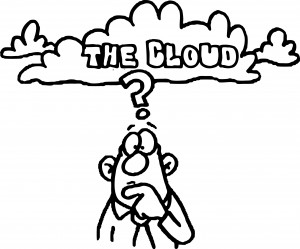 Guest Blog by Colin Kelly
Guest Blog by Colin Kelly
As a lover of gadgets and technology I’m ashamed to admit I didn’t really understand ‘the cloud’ at first. Now I’ve seen it in action first hand and the only thing I can’t get my head around is why small businesses aren’t signing up in their droves.
That could be about to change with the news today that Cisco just paid 750 million pounds for American cloud firm Meraki. That’s even more than Facebook paid when it took over Instagram back in the summer and a clear sign that the big players recognise this is the most exciting development in Information Technology for years.
So what is it, why is there so much interest and what can ‘the cloud’ do for you?
Put simply, ‘the cloud’ means accessing IT services over the internet. You’re probably familiar with the concept if not the name and, like me, might already be using the cloud without realising. If you’re a Gmail user, have an iTunes or Flickr account or do anything with a Google Chromebook you’re using the cloud. But the services provided by ‘cloud computing’ firms are far more powerful and can save businesses a fortune.
That’s why the Scottish Government is so keen to help businesses here make the most of it. A spokesperson said:
“Cloud computing offers huge potential for Scotland. By enabling individuals to access systems remotely, it will help to reduce the need for travel – helping to cut carbon emissions, boost business productivity levels and improve the resilience of our public and private sector institutions. The Scottish Government is committed to developing a world-class digital infrastructure for the people of Scotland by 2020. Use of cloud services is a key part of this package, and the Scottish Government is working with Scottish Enterprise, Highlands and Islands Enterprise and Business Gateway to explore how we can use this to encourage Scottish businesses that are currently not online, to get online. The digital programme will also support those already online to make better use of the broadband that is available to them, including the growing range of cloud services.In the coming years this government will look to take advantage of new ways of remote working, including cloud computing, where this is a cost effective option.”
Sounds good but what does cloud computing for business mean in practice?
First, there are products like Hosted Desktop which give you access to your Windows desktop environment on any computer, phone or tablet regardless of its operating system. I wouldn’t believe it if I hadn’t seen it with my own eyes – iPads and Blackberries with full Windows capability accessing the most recent versions all your files and folders no matter where you are and what you’re using.
This means no messing around with memory sticks, no worrying about where the most up to date version of a presentation is and no hassle if your laptop is away for repairs – everything you need is available at any time, in ‘the cloud’ from any device you care to use.
That convenience and simplicity can’t be underestimated but this ‘cloud’ has a money saving lining. Instead of paying for an entire suite of Microsoft Office products (many of which you hardly use) cloud firms offer ‘Hosted Apps’ where you pick and choose what you need, for example Microsoft Excel and Microsoft Outlook and you can add extra apps such as Sage Accounts and your customer management tool. Whatever you choose is automatically updated and protected with the latest anti virus software. Just think of the time your business wastes waiting for downloads, updates and installations. With ‘the cloud’ that’s gone.
Then there’s Hosted Voice which can reduce your business phone bills to almost zero. If you’ve got offices in Glasgow, New York and Adelaide for example, customers can call one number and phones will ring at every location and you’d pay nothing for calling different sites within your organisation. You even have the option to play music on hold, record calls and divert to mobiles.
The cloud removes all the hassle of IT infrastructure. It’s more flexible and saves businesses time and money. But, perhaps surprisingly, it’s security that’s cited as one of the main reasons business owners give when they make the switch.
Think about the PC sitting in your office right now and the files stored on it. What systems do you currently have to protect it? What if someone came in and stole it? Or you left your laptop in the back of a taxi? Or the machine got damaged beyond repair in a flood or a fire?
When companies talk about all your files being held ‘in the cloud’ what they really mean is a highly secure server at a state of the art data centre. Access is controlled by biometric scanning, additional hardware ensures only you or designated members of your team can access your data, and there are fire suppression, climate control and power fail safe systems. If disaster struck your office, your business would be able to carry on as normal with everything stored safely and securely in the cloud.
With such a ringing endorsement from the Scottish Government, and a mega deal involving a giant like Cisco, it’s clear the cloud is about to become a highly competitive place, so it’s important you choose the right provider. My advice is look for one with excellent levels of customer service, a transparent pricing structure and a flexible approach so that as your business grows, the cloud grows with you.
Leave a Reply
